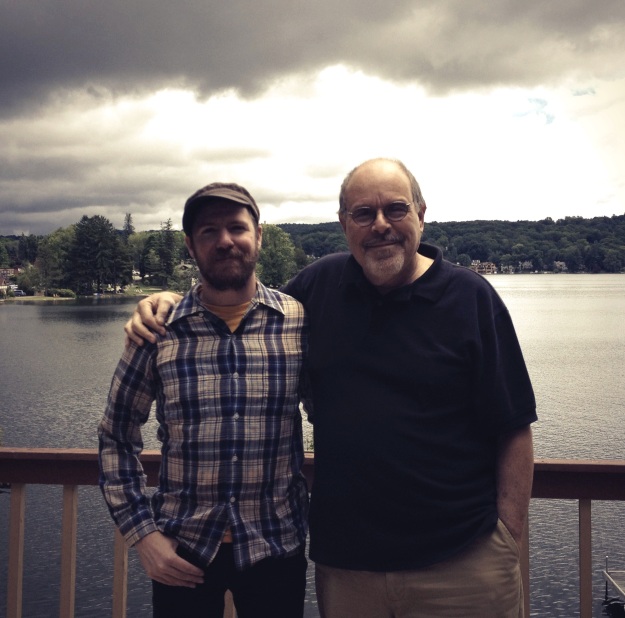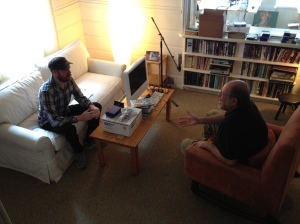 Well, what a ride it has been. In PART 1 of this interview we mostly talked about guitars, and in PART 2 we covered the European folk scene in the ’60s and ’70s. We wrap up our interview with some thoughts on his work in the here and now…
Well, what a ride it has been. In PART 1 of this interview we mostly talked about guitars, and in PART 2 we covered the European folk scene in the ’60s and ’70s. We wrap up our interview with some thoughts on his work in the here and now…
W&W – Do you feel like itʼs come back around at all? In part because of the work youʼve done, so many more players are playing acoustic blues guitar, innovating…
Stefan – Some of it is great. Guy Davis… Eric Bibb, great singer, great guitar arrangements. There are other younger black players, white players that are really terrific. Iʼve contributed a certain amount, but Iʼm sure Ericʼs [Clapton] Robert Johnson records and unplugged records contributed much, much more. When The Rolling Stones do “Prodigal Son” or “You Gotta Move”, that really turns people on. One thing is for sure, if Eric Clapton does a Skip James tune, or Barbecue Bob – he did a great version of “Motherless Child” a number of years back – that doesnʼt increase Barbecue Bob sales, maybe by a half of a percentage point, but the kids are relating to a white singer singing that, not some old guy from the ʻ20s.
But you can just go on YouTube! I discovered Tom Feldmann, weʼre doing a lot of work with Tom now, I discovered him on YouTube and heʼs a great player! I must talk to Tom via the internet twenty times a day…
W&W – Tom has an upcoming instructional DVD on Son House, right?
Stefan – Thatʼs not out yet, but yes, and heʼs done Blind Willie Johnson, the gospel music of John Hurt… heʼs mostly a slide player. So weʼve got a new one coming out, Masters of Bottleneck Blues Guitar, a Fred McDowell lesson, Son House, Bukka White have been recorded, weʼre just waiting to get the TAB back. Heʼs a great player, heʼs 33! He turns me on to guys on YouTube.
W&W – Before today, I had wondered if Stefan Grossmanʼs Guitar Workshop was maybe located in your house, or if had offices, a warehouse somewhere…
Stefan – Well, historically if you wanted to run a “business”, you had to get a building, offices, warehouse, all that stuff. As a result, you have a DVD that retails for one amount, youʼre wholesaling it for another…
Our idea was that we wanted it lean and mean. So we have distributors, Mel Bay, Rounder Records, City Hall Records, in England itʼs Music Sales. So weʼll sell to Mel Bay at a certain price and theyʼll warehouse the stuff, or weʼll pay a little extra to have things warehoused at our DVD manufacturer in New York.
 W&W – And theyʼll do the fulfillment to places like Mel Bay…
W&W – And theyʼll do the fulfillment to places like Mel Bay…
Stefan – Exactly. So we try to keep it as simple as possible, and the only thing we run out of here is the mail order. Susan [Steel] takes care of that, completely. So as a result, we had to find a house that had a large basement! Weʼve got a lot of stuff in there. Every week, Susan will place an order from the DVD manufacturer, 10 of this, 20 of this, to make sure the shelves are full here… but most of the DVDs are warehoused at the manufacturer in New York.
W&W – Would you say that, at this point, youʼre out of the traditional record business? That is to say that if you discovered a young player that you were crazy about, who had original material, that you wouldnʼt feel compelled to put out their album?
Stefan – Well it used to be that you wanted to be signed to a company, because they could send out five thousand promo records to every radio station in the country. Nowadays, my advice to anyone is to do your own CD, and sell it at gigs yourself. You wonʼt be able to send out those five thousand copies, but if the CD is a vehicle to make money and spread your music, do it yourself. I canʼt do any better.
In the old days, a label like Windham Hill was successful because they were in the northwest and the radio stations would just play the hell out of the albums! It was at the right time. Nowadays that doesnʼt happen… people donʼt buy CDs, they expect everything for free! Our CDs, weʼre able to sell them because they have PDF files on them, this added value… but now everyone can make a CD. It used to be that if you had a vinyl record or a CD, it meant that you had arrived at a certain point in your professional life as a musician. But now, a kid at two years old can make a CD! The whole business has totally changed. Now you can fill up a hall because you have a hit on YouTube, like Andy McKee. He can fill up halls all over the place. It used to be the records, now itʼs the views.
W&W – Physical media is on the wane, and youʼve now got an on-demand service. Is it as successful as youʼd hoped it would be?
Stefan – Yes! For us, it hasnʼt decreased the amount of hard-copy DVDs that we sell, but it has increased the outreach of the material. Itʻs really convenient for people overseas, you donʼt have to pay postage, duties. That has really been great. And with the on-demand, weʼve been able to do what we havenʼt been able to do with physical: people have been asking for single lessons, and now you can get single tunes, on- demand. So that has been going very well. Itʼs increasing the possibilities.
W&W – Teaching-wise, do you feel that anything is being lost with the video being the primary method these days? Not everyone can have a great teacher to study with…
Stefan – The people that do instructional videos for us do teach, the DVDs arenʼt just glorified performances. We do those on Vestapol, our Guitar Artistry DVDs. But I believe that on the instructional videos, the person really needs to be able to instruct. Initially, in the early days of DVDs, we werenʼt able to put PDFs on them. So I thought that the one thing the audio lessons had was that if I was going to teach “Stagger Lee” by Mississippi John Hurt, I could actually put a track on there of John Hurt playing it. But now the DVDs have it all. They have the lessons, the audio tracks and bonus video performances. We try to pack as much as we can into it.
W&W – Is there a lot of renumeration involved with the work youʼre producing now, the families of the old blues players?
Stefan – All of it! If Iʼm going to do a DVD on Freddie King, I contact Wanda King, we have an agreement with her… if Iʼm doing The Guitar of Freddie King, itʼs different, I would contact the publishers. But morally, I feel like you have to do that. Unfortunately, in most cases the artists are gone, so weʼre contacting the estates. The only one that was weird was Son House, after he passed away his wife just wouldnʼt open the envelopes… she thought it was devilʼs music!
W&W – My last question… in the last year, youʼve released serious instructional DVDs on Lonnie Johnson, youʼve got Ernie Hawkins doing Big Bill Broonzy, Lightninʻ Hopkins, etc… so itʼs going on 100 year that a lot of this music has been around, and thereʼs still so much to uncover. Are there particular blues players that you feel will represent the next wave of discovery?
Stefan – Well, with the blues guys, there was a fixed amount of players who were truly great, who would interest guitar players. You have blues players, like John Lee Hooker, whoʼs a great player and musician, but I wouldnʼt make an instructional DVD of his style, necessarily. It is a finite amount. The hard part is to find the teacher who has gotten it completely. Like Ernie Hawkins is great for Gary Davis, Ari Eisinger is incredible for Blind Blake, Lonnie Johnson, Blind Boy Fuller…
With someone like Reverend Gary Davis, a normal company would release one or two DVDs and thatʼs it… because they donʼt want the DVDs competing with each other. But I donʼt care! We put out a four volume set, three double-DVD sets, and Ernie probably has enough to even go into the key of F… well, that ainʼt commercial! Thatʼs not how a business should operate!
W&W – But thereʼs a historical imperative!
Stefan – Sales-wise, I just donʼt care… itʼs important. Itʼs history being made, trying to put this music onto guitar. Ari, he works very slow, but thereʼs different projects I want for him.. Tom Feldmann, we have a whole list of projects for him to do.
What Iʼm trying to do is document those styles. The music is timeless, and learning to play in these styles, with these techniques, that should live on forever.
An immense thank you to Stefan and his family for their hospitality during our visit. Please go to http://www.guitarvideos.com to see all of the wonderful offerings from Stefan Grossman’s Guitar Workshop.

Man you killed it with this one. Great discussion and very easy-going conversation with an interesting guy. Great job.
Great interview. I learnt about Stefan from a guy at Collets and went to see him play many times at Les Cousins. He used to play a small Martin that had the sweetest tone I’d ever heard. He was a great inspiration to so many of us who were playing acoustic blues.